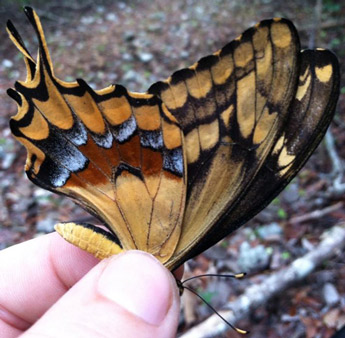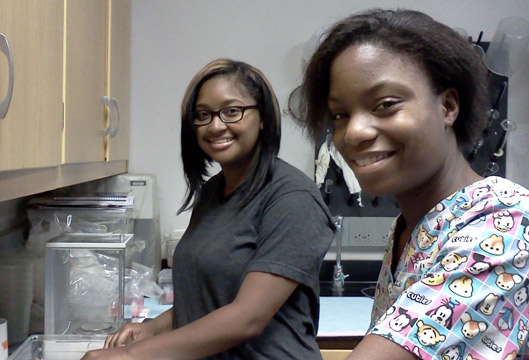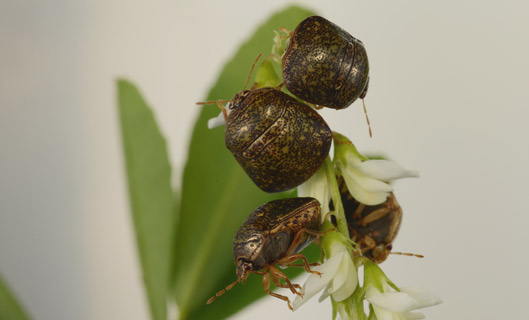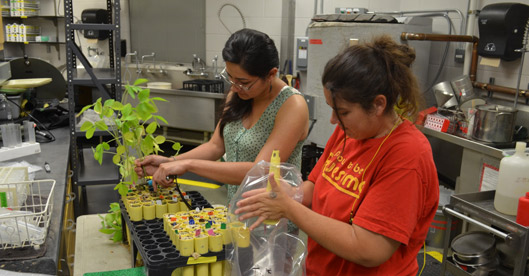- Faculty News
- Student News
- Lab News
- Publications
- Meetings and Presentations
- Outreach
- Grants
- Announcements
- About This Newsletter

ABOVE: South Florida's Schaus' swallowtail suffered a dramatic population crash in 2012. Graduate student and FLMNH team member Lary Reeves sent this image of a male the team found on July 6th.
Dr. Jeff Bloomquist, who's lab is in the Emerging Pathogens Institute (EPI), has been in the news lately. Dr. Bloomquist is part of a research team developing insecticides that kill mosquitoes but are harmless to other organisms. Bloomquist said the compounds could help fight malaria, a serious problem in Africa.
Dr. Jeff Bloomquist has been promoted to the Executive Editorial Board of Pest Management Science.
 UF hosted the first-ever BugWeek@UF
UF hosted the first-ever BugWeek@UF
The multimedia event, aimed to showcase the entomology program and educate residents, started Monday May 20th and lasted through Friday May 24th. Dr. Ruth Borger, assistant vice president for UF/IFAS communications, said the goal of BugWeek was to bring forward the research done by UF experts through social media. Borger said she hopes residents will log on to bugs.ufl.edu and learn that not all bugs are necessarily "bugly." Dr. Jennifer Gillett-Kaufman served as the BugWeek technical adviser.
 The McGuire Center’s annual newsletter is now available online. The McGuire Center newsletter is published annually and contains information on the current activities of the Center and its faculty, staff and students, including grants, research, publications and progress of collection curation.
The McGuire Center’s annual newsletter is now available online. The McGuire Center newsletter is published annually and contains information on the current activities of the Center and its faculty, staff and students, including grants, research, publications and progress of collection curation.


ABOVE: On June 5, a team of seven entomologists returned from a 12-day termite survey of Bolivia. The expedition team travelled over 4,000 km in areas not previously studied for termite diversity. The team included Drs. Rudi Scheffrahn, Jan Krecek, and Aaron Mullins (UF/IFAS Ft. Lauderdale REC), Jim Chase and John Mangold (Terminix International), Tom Nishimura (BASF Corp.) and Reginaldo Constantino (University of Brasilia). The greater Chaco, the central dry forests, and the Andes foothills yielded about 75 species including a number of new taxa in soldierless, nasute, and kalotermitid genera. This is the 70th expedition since 1990 to survey and describe the termites of the Neotropics.
 Dr. James P. Cuda was interviewed on May 10th about the recent outbreak of lovebugs by Bob Massey of Florida Weekly, a regional publication of Southwest Florida and Palm Beach.
Dr. James P. Cuda was interviewed on May 10th about the recent outbreak of lovebugs by Bob Massey of Florida Weekly, a regional publication of Southwest Florida and Palm Beach.
On May 20th, Dr. James P. Cuda was named new Chair of the Research Grant Committee by the Board of Directors of the Florida Exotic Pest Plant Council during their annual business meeting held in Panama City Beach, FL.
 Dr. Jennifer Hamel has been invited to attend the 2013 Women Evolving Biological Sciences (WEBS) Symposium in October at the National Evolutionary Synthesis Center in Durham, NC. From the symposium website: WEBS is an annual three-day symposium aimed at addressing the retention of female scientists and issues related to the transition of women from early career stages to tenure track positions and leadership roles in academic and research settings. For more information on the symposium: http://advance.washington.edu/webs/
Dr. Jennifer Hamel has been invited to attend the 2013 Women Evolving Biological Sciences (WEBS) Symposium in October at the National Evolutionary Synthesis Center in Durham, NC. From the symposium website: WEBS is an annual three-day symposium aimed at addressing the retention of female scientists and issues related to the transition of women from early career stages to tenure track positions and leadership roles in academic and research settings. For more information on the symposium: http://advance.washington.edu/webs/
 Being a Fulbrighter was a life changing experience for Dr. Attila Csontos, who was a student on a Fulbright Scholarship in the department.
Being a Fulbrighter was a life changing experience for Dr. Attila Csontos, who was a student on a Fulbright Scholarship in the department.
ABOVE: Dr. Attila Csontos new book draws parallels between life in the USA and Hungary.
Richard Baidoo and Sudarshan Aryal, Ph.D. students of Dr. Crow, both past their Ph.D. qualifying exams with flying colors. Great job!
 Ph.D. candidate Lacey Jenson was awarded the 2013 Pauline O. Lawrence award in Physiology/Biochemistry/Toxicology. Lacey works in the Bloomquist lab at EPI.
Ph.D. candidate Lacey Jenson was awarded the 2013 Pauline O. Lawrence award in Physiology/Biochemistry/Toxicology. Lacey works in the Bloomquist lab at EPI.


ABOVE: Brooke Cantrell (left) and Alexis Taylor (right) are both IFAS summer undergraduate interns working with Dr. Emma Weeks in the Veterinary Entomology Lab on brown dog tick IPM. Brooke's project involves testing of dust based control products for efficacy, and Alexis is trying to establish the temperature and durations required to kill ticks on dog bedding by washing or drying. Both students will be working in the lab all summer.
 Ashley Mortensen, a Ph.D. student of Dr. Ellis, has been selected to receive a UF/CALS Davidson Graduate Student Travel Scholarship. This scholarship is for $650 and will support her travel expenses to the XXXXIII International Apiculture Congress in Kiev, Ukraine.
Ashley Mortensen, a Ph.D. student of Dr. Ellis, has been selected to receive a UF/CALS Davidson Graduate Student Travel Scholarship. This scholarship is for $650 and will support her travel expenses to the XXXXIII International Apiculture Congress in Kiev, Ukraine.
 Martin MacKenzie, one of Dr. Rebecca Baldwin's distance MS students, has created a PSA about moving firewood in California. It is the second PSA listed. Martin will be here in Gainesville in July for his exams and will also present a seminar for the department.
Martin MacKenzie, one of Dr. Rebecca Baldwin's distance MS students, has created a PSA about moving firewood in California. It is the second PSA listed. Martin will be here in Gainesville in July for his exams and will also present a seminar for the department.
 The American Mosquito Control Association featured Natasha Marie Agramonte, a doctoral student and research technician at the USDA-ARS-CMAVE, in a new segment of their monthly newsletter, 'AMCA Young Professional Spotlight.'
The American Mosquito Control Association featured Natasha Marie Agramonte, a doctoral student and research technician at the USDA-ARS-CMAVE, in a new segment of their monthly newsletter, 'AMCA Young Professional Spotlight.'
 Bee Unit Beautification Project by ENSO
Bee Unit Beautification Project by ENSO
With the help of the Entomology and Nematology Student Organization (ENSO) the Bee Biology & Research Unit is getting beautified! The Apiary at HBREL's Bee Unit hosts numerous activities over the course of the year. They annually host the 4-H summer camp, tours for homeschool groups, Santa Fe courses, UF elective courses and of course the Principles of Entomology labs. The clean-up is scheduled for later in the month, and we hope to post some before and after photos.
Need to name that bug? A host of experts are available to help Floridians identify any insect or related arthropod. If a mystery creature has six or more legs, the UF Insect ID Lab is the place to call.

ABOVE: Another exotic bug is spreading fast in northern and central Florida! The kudzu bug, Megacopta cribraria, was first detected in the US in northern Georgia in late 2009. It made its way into north Florida by March 2012, and by October was already found in 16 Florida counties. It represents a new insect family (Plataspidae) for the US, a relative of the stink bugs. Check out the Featured Creatures article and the March 2013 issue of the Florida Entomologist for more information.
Lyle Buss is the Insect ID Lab manager.
 Think it might be a nematode problem? The Nematode Assay Laboratory serves Florida and other states by providing nematode assay and expert advice regarding nematode management.
Think it might be a nematode problem? The Nematode Assay Laboratory serves Florida and other states by providing nematode assay and expert advice regarding nematode management.
The Florida Nematode Assay Laboratory is hosting its first Doctor of Plant Medicine intern this semester, Lisbeth Espinoza Lozano. The internship provides hands-on experience with nematode soil and root assays, experimental design, setup, and evaluation of nematode management trials, as well as an introduction to molecular nematode identification. The internship is open to DPM students during all semesters and can be customized to fit the intern’s class and work schedules.

ABOVE: Lisbeth Espinoza (left) and Lisa Valencia (right) breaking down an evaluation for biological control options of Heterodera glycines.
The Florida Nematode Assay Laboratory will be hosting a nematode identification workshop for extension specialists and industry professionals June 27th and 28th. The workshop will focus on common nematode extraction methods as well as provide a basic background in the identification of the most commonly encountered plant-parasitic nematode genera in Florida.
For more information on the Nematode Assay Laboratory please contact the Lab Manager Dr. Tesfa Mengistu.
Crow WT, Luc JE, Sekora NS, Pang W. 2013. Interaction between Belonolaimus longicaudatus and Helicotylenchus pseudorobustus on bermudagrass and seashore paspalum hosts. Journal of Nematology 45: 17-20.
Gill HK, McSorley R. 2012. Methods for sampling soil surface arthropods in bush beans: Which one is the best? Proceedings of the Florida State Horticultural Society 125: 192-195.
Halbert SE, Wu Y, Eigenbrode SD. 2013. Metopolophium festucae cerealium (Hemiptera: Aphididae), a new addition to the aphid fauna of North America. Insecta Mundi 301: 1-6.
Koppenhofer AM, Latin R, McGraw BA, Brosnan JT, Crow WT. 2013. Integrated pest management. pp. 933-1006. In: Stier JC et al. (eds). Turfgrass: Biology, Use, and Management. American Society of Agronomy, Madison, WI.
Mann RS, Rouseff RL, Smoot J, Rao CN, Meyer WL, Lapointe SL, Robbins PS, Cha D, Linn C, Webster FX, Tiwari S, Stelinski LL. 2013. Chemical and behavioral analysis of the cuticular hydrocarbons from Asian citrus psyllid, Diaphorina citri. Insect Science 20: 367-378.
Qureshi JA, Kostyk BC, Stansly PA. 2012. Registered and Experimental Insecticides for Control of Asian Citrus Psyllid and Citrus Leafminer on Mature Orange Trees. Proceedings of the Florida State Horticultural Society 125: 92-97.
Qureshi JA, Khan AA, Jones M, Stansly PA. 2013. Management of Asian citrus psyllid in organic citrus groves. Citrus Industry 94: 6-10.
Stansly PA, Roka F. 2013. Economics of HLB vector control and foliar nutrition. Citrus Industry 94: 6-9.
Zettel Nalen CM, Allan SA, Becnel JJ, Kaufman PE. 2013. Oviposition substrate selection by Florida mosquitoes in response to pathogen-infected conspecific larvae. Journal of Vector Ecology 38: 182-187.
 New on Featured Creatures:
New on Featured Creatures:
Do you have a favorite creature? Learn how to make it into a Featured Creature!granulate cutworm, Feltia subterranea (Fabricius) Author: John L. Capinera, Entomology and Nematology Department, University of Florida.
olive shootworm, Palpita persimilis Munroe Authors: James E. Hayden, Florida Department of Agriculture and Consumer Services, Division of Plant Industry, and Lyle J. Buss, University of Florida.
scarlet-bodied wasp moth, Cosmosoma myrodora (Dyar) Authors: Diego Moscoso, Rodrigo Diaz, William A. Overholt, Biological Control Research and Containment Laboratory, University of Florida.
Dr. James P. Cuda was an invited speaker at the Joint Annual Symposium of the Florida Exotic Pest Plant Council and Southeast Exotic Pest Plant Council meeting held in Panama City Beach, FL, May 20th to the 23rd. Cuda presented a paper titled "Effects of defoliation on growth and reproduction of Brazilian peppertree (Schinus terebinthifolius)" and was co-author on two other presentations- an oral presentation cogongrass biological control and a poster on Calophya spp., leaflet galling psyllid natural enemies of Brazilian peppertree.
 Dr. Jawwad Qureshi, Barry Kostyk and Dr. Phil Stansly presented "Microbial and synthetic insecticidal sprays for Asian citrus psyllid and citrus leafminer control in oranges" at the 126th annual meeting of the Florida State Horticultural Society 2013 held in Sarasota, FL.
Dr. Jawwad Qureshi, Barry Kostyk and Dr. Phil Stansly presented "Microbial and synthetic insecticidal sprays for Asian citrus psyllid and citrus leafminer control in oranges" at the 126th annual meeting of the Florida State Horticultural Society 2013 held in Sarasota, FL.
We have several social media sites for the Entomology & Nematology Department. To make them easily searchable, all three (YouTube, Facebook and Twitter) have the same page name, UFEntomology. Please share these links with past students or colleagues who may have an interest in departmental activities.
The DPM program would like to invite our newsletter readers to like their Facebook page to keep up with DPM events and developments. Be sure and "Like" the DPM Facebook page.
Honey Bee Research and Extension Laboratory wants you to follow them on twitter to find out about upcoming events and interesting stories about honey bees @UFHoneybeelab.
Dr. James P. Cuda participated in a Cogongrass Workshop held at the Indian River REC, Ft Pierce, FL, May 15th. This workshop covered various aspects of cogongrass biology, ecology and management for extension agents, regional biologists and public/private land managers. Cuda was co-author of a presentation titled "Biocontrol of Cogongrass," which highlighted the results of his recent surveys in East Africa for cogongrass natural enemies.
 From the Outreach Coordinator
From the Outreach Coordinator
Bug Camp is June 24th to the 28th, so if you know of any kids that would like to attend, have their parents contact Dr. Rebecca Baldwin.
We have been busy with outreaches in April and May (after FCAT). We had outreaches at Queen of Peace, Lake Forest Elementary, Camp Kulaqua, Newberry Elementary, Saddlewood Elementary, South Ocala Elementary, Belleview Elementary, Kimbal Wiles Career Day, Touch a Truck, Wyomina Elementary, and Sparr Elementary. We also had a departmental tour. For the summer, we have five outreaches in June and five in July, all of them are local, short events. If you can find it in your schedule to volunteer, that would be great.
The live critters are always a hit with children and adults alike. The critters are available for you to check out should you be leading an outreach event. We have doubles of our most popular critters, as well as various native insect species depending on the time of year. We have large wood and Plexiglas cages for viewing our native orb weaving spiders. There is one travel cage and one larger static cage. Please be sure to contact us and review the protocol on transporting and handling the critters if you are not already familiar with it. If you lead an outreach, be sure to fill out a documentation form so your event can be included in the newsletter and we can log all outreach events.
If you would like to schedule an event or have any outreach questions, go to the Outreach pages on our Bug Club Website and contact us. I look forward to working with all of you over the next four years.
- Stephanie Stocks, Outreach Coordinator
- Office number 352-273-3958
Virni Mattson, our Grants Specialist, reports that May 1st to 31st, 2013, we have had 6 new grants or contracts awarded for a total of $264,017 in external funding for all Entomology & Nematology faculty (in Gainesville and at RECs).
Dr. Jennifer Gillett-Kaufman was awarded a 2013 UF Technology Fee Grant for $77,600. Grant title: Wi-Fi and distance learning in the Natural Area Teaching Lab (UF/NATL), UF’s only 60-acre outdoor classroom on campus. This grant will provide electricity to the NATL shed and pavilion, wildlife viewing cameras that will stream live content to the NATL website, and Wi-Fi coverage that will increase students ability to use NATL as an outdoor classroom.Register now: Due to the overwhelming popularity of HBREL’s Bee College (held annually in March at Marineland), this beekeeping extension event is expanding again - this time to South Florida. The first ever South Florida Bee College is planned for August 16th and 17th at the UF/IFAS Fort Lauderdale Research and Education Center.
The event will feature prominent Florida beekeeping professionals and researchers giving lectures and hosting workshops on basic through advanced topics. There will be nearly 50 courses over the two days, a 20-class Honey Show, great food and beekeeping vendors. SFBC will feature a Spanish-speaking track for the first time and is open to the public. Saturday August 17th is National Honey Bee Day and hosts the theme "Beekeeping – ask me how to get started."

Come and see what the Natural Area Teaching Lab (NATL) has to offer your curriculum, research and physical fitness.
Located adjacent to Steinmetz Hall, NATL is a fantastic resource for all UF faculty, staff and students. Enhance your curriculum by offering a unique field trip to NATL. Regardless of your study area, NATL is open to everyone; you can enjoy an outdoor lunch at one of the picnic tables in the Natural Area Park, take a walk on a 500ft boardwalk across an ecologically engineered wetland, or stroll and learn on one of the four self-guided nature trails. Reduce your nature-deficit! Spend break time visiting the most fascinating natural area on campus.
For more information on the resources and educational and recreational opportunities NATL has to offer or to schedule a research or a class visit, please visit our website or contact us at natl@ufl.edu. We are very interested in facilitating the use of NATL for courses that are being delivered by distance. Contact us for ideas.
 The 96th Annual Meeting of the Florida Entomological Society
The 96th Annual Meeting of the Florida Entomological Society
More information on the meeting. A draft of the 2013 Annual Meeting Program has been posted. Please take a look and alert Dr. Na-Yao Su if you find any problem with your listings.
The FES annual meeting will be held July 14th to the 17th at the Waldorf Astoria Hotel in Naples, Florida. Unfortunately, the Waldorf Astoria is out of rooms at the conference rate for our meeting. There are rooms available at the street price as of today. There are rooms available at the Naples Hilton. You can book a room with them using 1-800-Hilton. They are located at 5111 Tamiami Trail North in Naples. The Hilton is 0.8 miles from the Astoria (475 Seagate). If you tell them you are with the Florida Entomological Society, the Society can keep track of who is staying at the property for logistical purposes. There are several other properties in Naples, but the Hilton is the nearest property to the Astoria.
Last call, the deadline for FES award nominations is July 1st: The Honors and Awards Committee are requesting nominations for 2013 in the following categories
Entomologist of the year.
Annual Achievement Award for Research.
Annual Achievement Award for Extension.
Annual Achievement Award for Industry.
Annual Achievement Award for Teaching.
Annual Achievement Award for Regulatory Entomology.
Achievement Award for a Collaborative Research Team.
Any other special awards.
Winners will be announced at the 2013 Annual Meeting. Each nomination should be accompanied with a justification narrative that will be read at the awards luncheon.
You can see the previous winners here.
Nominations should be sent to:
Dr. Steven Arthurs [Chair, Honors and Awards Committee]
Mid-Florida Research and Education Center
Institute of Food and Agricultural Sciences University of Florida
2725 Binion Road
Apopka, FL 32703-8504 USA
Ph: 407-884-2034 x 113
Two CEU Classes, July 15th during the FES meeting
Workshop: Removing Honey Bees from Structures (2 CEUs for Commercial GHP, or Limited Structural). Instructor: William H. Kern, Jr. Ft. Lauderdale Research and Education Center, IFAS, University of Florida 10 am to 12 pm.
This workshop will discuss honey bee biology and how to remove honey bee colonies from structures. Both lethal pest control techniques and non-lethal beekeeper techniques will be discussed and demonstrated.
Symposium: Exotic Whitefly (2 CEUs for Commercial L&O, or Limited Urban Fertilization, or Limited Landscape Maintenance). Organizer: Cindy McKenzie, US Horticultural Research Laboratory, ARS-USDA. 1:30 pm to 5:00 pm.
The session includes eight presentations to review the historical perspective of exotic whitefly in Florida and update the current situation focusing on ficus, bondars and ruguse spiraling whiteflies. Other topics include outreach efforts at the state and community levels, biology and population dynamics, and the ongoing collaborative research efforts across the state.
Cost: $50 for non-FES member to attend the CEU classes only. Free for registered FES member. Annual fee to join FES is $40.
We like to share news when it happens using our social media outlets- Twitter, Facebook and YouTube. Follow us on these sites for daily updates! When you send news, we will post it on one or more of these sites and again in the monthly newsletter. Please be sure you have permission from people in photographs you submit for publication.
UF-Bugnews-L listserv subscribers receive notices when issues are posted. Our home page has instructions for subscribing and unsubscribing.
Special thanks to Dr. Verena Lietze and Nancy Sanders who reviewed the newsletter for errors and to Jane Medley who built the web page.